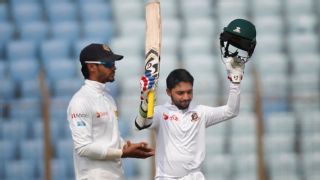|
Bangladesh's Test aspirations usually get drowned out by the sights and sounds of ODI progress and T20I relapse. Many forget that it was the granting of Test status that ultimately helped them become a better ODI team, that Full Membership ensured they became serious about grassroots development and fitness among other things. And yet Bangladesh have only played 31 Tests in the last six years. That is less than the 40 they played between 2000 and 2005, or the 35 between 2006 and 2012. All this makes forging a career, while only playing Test cricket, pretty hard work. Like all modern cricketers, Bangladeshis too strive hard to adapt to all formats. It is not that Mominul Haque hasn't, or doesn't, try to bat with a higher strike-rate, but he has been tagged as a Test specialist and is now having trouble shrugging that label off. Like any sportsperson, Mominul doesn't like to wait for his next contest. Yet he has to. He has to keep training knowing that he will have to wait months between matches. After the Test series against Sri Lanka in February this year, Mominul had to bide his time in domestic cricket as many of his team-mates played T20Is against Sri Lanka and later Afghanistan. He trained at the Shere Bangla National Stadium, preparing for July 4, the day of his next big contest: the start of the Bangladesh-West Indies Test series. But this year the wait would have been a little sweeter. Mominul has been in good form, having become the first Bangladeshi to score hundreds in each innings of a Test match, against Sri Lanka , in Chittagong. The 176 he made in the first innings - off only 214 balls, at a strike-rate of 82 - proved he had all the shots. The 105 that followed - off 174 balls - ensured Bangladesh could survive the final day, a task they have never been too good at, and secure a draw.  While many Test nations would honour such batsmen, those in charge of selection and management of the Bangladesh team don't seem to quite know what to do. After Mominul's dismissal in the second innings, Bangladesh still needed to survive 90 more minutes which stand-in captain Mahmudullah and Mosaddek Hossain did quite well. But for the next game, Mosaddek was dropped. "You have to bat in that way for your team," Mominul told ESPNcricinfo. "The centuries weren't in my mind. I was trying to save the game for my team. I don't usually make a lot of noise but I do think about these types of knocks. I saved the Test with the second-innings hundred, which meant I could do something for the team. "A draw from that situation would have been very important for any side. For us, especially, it was vital as we don't usually save matches from that point [Bangladesh had conceded a lead of 200 runs]. We couldn't relax as we hadn't done this regularly in the past. So returning from the jaws of defeat is certainly something special." His team-mates also understand what he brings, especially in constantly bouncing back from long breaks. When Chandika Hathurusingha dropped him last July, the outrage from cricket fans and unease inside the Bangladesh dressing room spoke volumes of Mominul's value to the Test side. He is not the most attractive batsman, and he doesn't talk a big game, but barring a few Test innings, he has been quite consistent. When you consider the number of Bangladesh cricketers who started off as brightly as Mominul did but burned out quickly, you begin to appreciate his value more. When asked why other cricketers in the country have tapered off so fast, Mominul's answer was both surprising and instructive. "Your first ten to 15 international games just whizz past before you realise anything. Tamim [Iqbal] bhai always says that a Bangladeshi player is really identified after 20 innings. I agree with him. In the first 10-15 games, the opponents don't really know what to do with a particular player. But once he becomes a regular in international cricket, he can't sit on that same fitness and skills but [has to] keep improving. He can't afford to rest on his laurels. "I think we demand less of ourselves. A player should think of improving all the time, otherwise he will remain in that same level and someone else will take his place. Not to mention, opponents will read him better and take advantage of the knowledge." Mominul knows this side of international cricket better than most. When he made his breakthrough 181 against New Zealand in Chittagong in 2013, the fast bowlers kept feeding his square cut. When he went to West Indies the following year, his height perhaps prompted the fast bowlers there to only bowl short, which he dealt with quite easily. It took a while before teams realised that pace might not get him, but floaty offspin could. Dilruwan Perera, Moeen Ali and Nathan Lyon have troubled Mominul but once he recognised the problem, he tackled it head on. He asked his mentor Mohammad Salahuddin to give him some time early in the winter of 2017. The pair made subtle changes to the way Mominul defended and attacked offspin. Facing Dilruwan in 2018, Mominul scored 98 runs off 147 balls across four innings - and didn't get out once to the bowler. "It is entirely about your mentality. You learn different things in each series. Against Australia last year, we focused on playing spin. In South Africa, it was all about pace and bounce. When Sri Lanka arrived, it was all about spin. To avoid being surprised, I try to work on every little aspect. I don't want to be dumbfounded when I am in the middle." Against West Indies, Mominul will know that much of the challenge will be to tackle a barrage of bouncers. He has had to rely on the bowling machine back in Dhaka for much of his preparation. He tackled the challenge well during Bangladesh's last tour to West Indies in 2014, but as he has shown, Mominul is not the kind to rest on his laurels.
|

